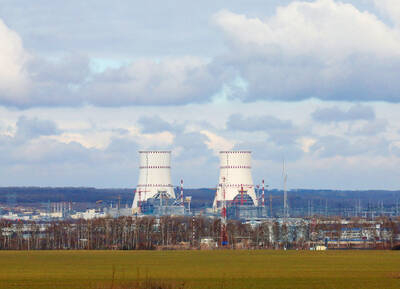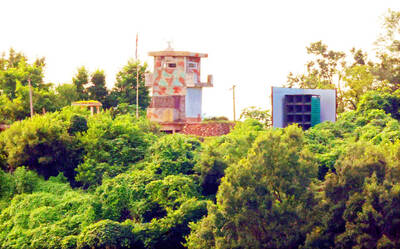Six years after presiding over the return of one of Britain's last remaining colonial jewels to China, Tony Blair was due to arrive in Hong Kong yesterday to find the territory gripped by economic and political turmoil.
The British premier -- making his second visit since the 1997 handover and his first for five years -- will walk headlong into Hong Kong's worst political crisis since the end of colonial rule.
Hong Kong is still suffering from the fall-out of the Asian financial crisis and searching for an identity within China, and Blair will find a less confident and less content city when he arrives late yesterday from Shanghai on the last leg of a gruelling global trip.
Although still one of Asia's leading financial centers, the legendary dynamism present pre-1997 has been dimmed by six years of economic gloom.
The Asian financial crisis just months after the 1997 handover, a second recession in 2001 and most recently the SARS outbreak have hammered the city's economy sending property prices nosediving 60 percent while unemployment has soared to a record 8.6 percent.
Pro-democracy groups are hoping Blair will be "assertive" in talks with chief executive Tung Chee-hwa (董建華) over a controversial national security bill, which on July 1 drew 500,000 protesters onto the streets and left Tung battling to maintain credibility.
Speaking in Beijing on Monday Blair trod a fine line, calling for greater democracy in Hong Kong and welcoming the temporary shelving of the security law while at the same time praising China's handling of the prickly issue.
"I think it is important to set this in the context of the Joint Declaration we negotiated with China that allows `one country, two systems' to operate," said Blair after talks with China's top leaders.
The decision to re-examine national security legislation was "a sensible way to proceed," he said.
In an apparent reference to plans for Hong Kongers to directly elect Hong Kong's chief executive from 2007, Blair said in Beijing: "There are proposals to move toward greater democracy in Hong Kong. Obviously we support that. I hope very much we can get that process of change back on track."
Although the pro-democracy camp in Hong Kong welcomed Blair's comments, they expressed hope he would reiterate his statements in stronger terms during a planned meeting with Tung.
The Tung administration's handling of the unpopular legislation has already forced the resignation of two senior cabinet ministers, and the Beijing-backed Tung has also faced mounting calls to step down.
Under the 1984 Joint-Declaration between Britain and China, Hong Kong was promised control over most of its own affairs for 50 years. But many feel the sweeping nature of the security law posed a major threat to cherished freedoms.
Richard Tsoi (蔡耀昌), a spokesman for the Civil Human Rights Front which mobilised the July 1 march, said as a signatory to the Joint-Declaration "the British had a special role to ensure it was correctly applied."
"Ultimately it is for Hong Kong people to fight for its own rights ... but it is still important for Mr. Blair to express Britain's concerns to Hong Kong authorities," Tsoi said.
Sonny Lo, a political analyst at Hong Kong University, said Blair had to move away from his "silent, passive approach on the issue of democracy in Hong Kong for fear of antagonising Beijing" and be more assertive.
Pro-democracy legislator Lee Cheuk-yan also said Blair needed to speak out.
"Mr Blair will find Hong Kong has changed a lot in the six years of Tung's rule, particularly the awareness of the need for democracy ... the British should take note of that sentiment," Lee said.

Philippine President Ferdinand Marcos Jr has fired his national police chief, who gained attention for leading the separate arrests of former Philippine president Rodrigo Duterte on orders of the International Criminal Court and televangelist Apollo Carreon Quiboloy, who is on the FBI’s most-wanted list for alleged child sex trafficking. Philippine Executive Secretary Lucas Bersamin did not cite a reason for the removal of General Nicolas Torre as head of the 232,000-member national police force, a position he was appointed to by Marcos in May and which he would have held until 2027. He was replaced by another senior police general, Jose

POWER CONFLICT: The US president threatened to deploy National Guards in Baltimore. US media reports said he is also planning to station troops in Chicago US President Donald Trump on Sunday threatened to deploy National Guard troops to yet another Democratic stronghold, the Maryland city of Baltimore, as he seeks to expand his crackdown on crime and immigration. The Republican’s latest online rant about an “out of control, crime-ridden” city comes as Democratic state leaders — including Maryland Governor Wes Moore — line up to berate Trump on a high-profile political stage. Trump this month deployed the National Guard to the streets of Washington, in a widely criticized show of force the president said amounts to a federal takeover of US capital policing. The Guard began carrying

Ukrainian drone attacks overnight on several Russian power and energy facilities forced capacity reduction at the Kursk Nuclear Power Plant and set a fuel export terminal in Ust-Luga on fire, Russian officials said yesterday. A drone attack on the Kursk nuclear plant, not far from the border with Ukraine, damaged an auxiliary transformer and led to 50 percent reduction in the operating capacity at unit three of the plant, the plant’s press service said. There were no injuries and a fire sparked by the attack was promptly extinguished, the plant said. Radiation levels at the site and in the surrounding

‘DELIBERATE PROVOCATION’: Pyongyang said that Seoul had used a machine gun to fire at North Korean troops who were working to permanently seal the southern border South Korea fired warning shots at North Korean soldiers that briefly crossed the heavily fortified border earlier this week, Seoul said yesterday after Pyongyang accused it of risking “uncontrollable” tensions. South Korean President Lee Jae-myung has sought warmer ties with the nuclear-armed North and vowed to build “military trust,” but Pyongyang has said it has no interest in improving relations with Seoul. Seoul’s military said several North Korean soldiers crossed the border on Tuesday while working in the heavily mined demilitarized zone (DMZ) separating the two Koreas. The incursion prompted “our military to fire warning shots,” South Korea’s Joint Chiefs of Staff